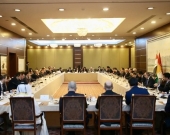Turkey unveils tunnel linking Europe and Asia

The tunnel, to be opened on Tuesday, is among a number of large infrastructure projects under the government of Prime Minister Recep Tayyip Erdogan that have helped boost the economy but also have provoked a backlash of public protest.
The tunnel is 13.6km long, with 1.4km running under the Bosporus, the strait that connects the Black Sea to the Sea of Marmara and divides Istanbul between Asia and Europe.
Turkish officials say that at more than 55-metre deep, it will be the deepest submerged railway tunnel of its type in the world.
Officials hope that with a 1.5 million passengers a day, it will ease some of Istanbul's chronic traffic, particularly over the two bridges that currently connect the two sides of the city.
The project started in 2005, and was scheduled to be completed in four years, but was delayed by important archaeological finds, including a 4th century Byzantine port, as builders began digging under the city.
The tunnel has raised fears that it could be vulnerable to earthquakes in a region of high seismic activity.
But Binali Yildirim, Turkey's transport minister, said that it was designed to withstand a massive 9.0 magnitude quake.
He called it "the safest place in Istanbul".
Ottoman Sultan Abdulmejid is said to have first proposed the idea of a tunnel under the Bosporus about a century and a half ago.
One of his successors, Abdulhamid, had architects submit proposals in 1891, but the plans were not carried out.
The tunnel is just one of Erdogan's large-scale plans.
They include a separate tunnel being built under the Bosporus for passenger cars, a third bridge over the strait, the world's biggest airport, and a massive canal that would bypass the Bosporus.
The projects have provoked charges that the government is plunging ahead with city-changing plans without sufficient public consultation. The concern fuelled protests that swept Turkey in June.
Tuesday's ceremony on the 90th anniversary of the founding of the Turkish Republic will be attended by Erdogan and other officials, including Japanese Prime Minister Shinzo Abe, whose country was heavily involved in the construction and financing of the railway tunnel project.
AP












